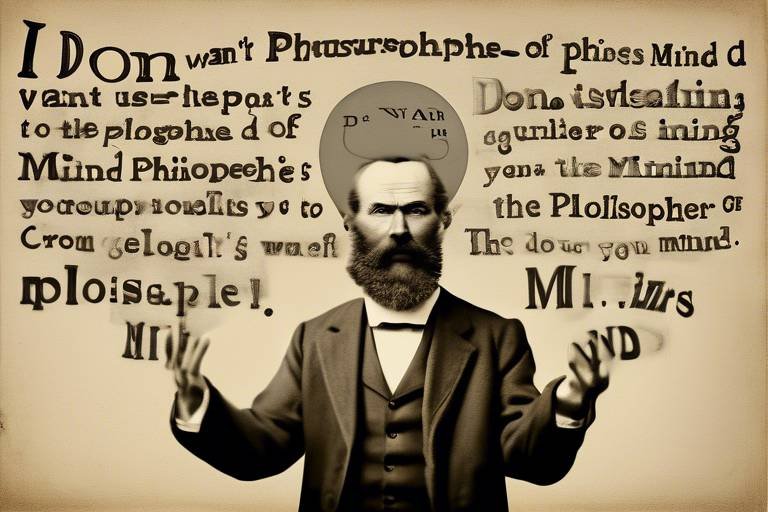Philosophy of Mind - A Synopsis
The philosophy of mind is a fascinating field that dives deep into the intricate workings of consciousness, mental states, and their connection to the physical world. It's a realm where questions abound, and answers often elude us. What does it mean to think? How do our thoughts relate to our physical bodies? These questions are not just academic; they strike at the core of what it means to be human. As we journey through this philosophical landscape, we will explore various theories and perspectives that aim to demystify the mind and its profound complexities.
At the heart of the philosophy of mind lies the **nature of consciousness**. This enigmatic phenomenon has puzzled philosophers for centuries. Some suggest that consciousness is merely an emergent property of physical processes, while others argue it is a fundamental aspect of existence. Imagine consciousness as a vast ocean, with each wave representing a different thought or feeling. As we navigate through this ocean, we encounter various currents—each theory offering a unique perspective on the nature of our awareness and experience.
Furthermore, the debate between **mind-body dualism** and **physicalism** adds another layer of complexity. Dualism posits that the mind and body are separate entities, while physicalism argues that everything about the mind can be explained through physical processes. Think of this as two sides of the same coin, each providing valuable insights into our understanding of mental phenomena. Throughout this article, we will dissect these viewpoints, examining their implications and the compelling arguments that have shaped philosophical discourse.
As we delve deeper, we will encounter the **problem of other minds**, a philosophical quandary that challenges our ability to know whether other beings possess minds similar to our own. This issue raises intriguing questions: How can we be sure that our friends, family, or even pets experience consciousness in the same way we do? To address this, we will explore various philosophical approaches, including behaviorism and the concept of phenomenal consciousness, which focuses on subjective experiences and the essence of qualia—those unique qualities of our experiences that make them distinctly ours.
In summary, the philosophy of mind is a rich tapestry woven from various threads of thought, each contributing to our understanding of consciousness and mental states. As we continue this exploration, we will encounter historical figures like René Descartes, whose dualist arguments have left a lasting impact, as well as contemporary philosophers who strive to reconcile these age-old debates with modern scientific findings. Join us as we embark on this intellectual adventure, seeking to unravel the mysteries of the mind and its place in our understanding of reality.
- What is the philosophy of mind? The philosophy of mind is a branch of philosophy that explores the nature of consciousness, mental states, and their relationship to the physical world.
- What are the main theories in the philosophy of mind? The main theories include mind-body dualism, physicalism, and behaviorism, each offering different perspectives on how the mind and body interact.
- What is the problem of other minds? The problem of other minds questions how we can know that other beings have minds similar to our own, raising issues about consciousness and subjective experience.
- Who is René Descartes? René Descartes was a 17th-century philosopher known for his dualist perspective, arguing that the mind is a non-physical substance distinct from the body.

The Nature of Consciousness
Consciousness is one of those intriguing puzzles that have captivated philosophers, scientists, and curious minds alike for centuries. It's that elusive quality that makes us aware of our thoughts, feelings, and surroundings. But what exactly is consciousness? Is it merely a byproduct of brain activity, or does it represent something deeper and more profound? This question opens a Pandora's box of theories and debates that challenge our understanding of the mind and its role in our existence.
To simplify, consciousness can be thought of as the stage on which our mental play unfolds. Imagine a theater where various actors (our thoughts, emotions, and perceptions) come together to create a rich tapestry of experience. But unlike a typical performance, this stage is not just a backdrop; it actively shapes the play itself. Philosophers have proposed several theories to explain this complex phenomenon:
- Physicalism: This view argues that consciousness arises solely from physical processes in the brain. It's like saying that the orchestra playing in the theater is the only thing that matters; without the musicians, there would be no music.
- Dualism: In contrast, dualists believe that consciousness exists independently of the physical brain. Think of it as a ghostly presence that influences the play but isn't part of the physical cast.
- Panpsychism: This fascinating theory suggests that consciousness is a fundamental quality of all matter. It's akin to saying that every seat in the theater has a tiny bit of awareness, contributing to the overall performance.
As we delve deeper into the nature of consciousness, we encounter the concept of qualia—the individual instances of subjective experience. For instance, consider the taste of chocolate. While you can describe its flavor in terms of sweetness and richness, the actual experience of tasting chocolate is something profoundly personal and cannot be fully conveyed through words. This brings us to a critical question: how can we understand someone else's consciousness when our experiences are inherently subjective?
Moreover, the relationship between consciousness and the brain is a hotbed of inquiry. Neuroscientists have made remarkable strides in mapping brain activity to conscious experience, yet the question of how physical processes translate into subjective experience remains unanswered. This is often referred to as the hard problem of consciousness, a term coined by philosopher David Chalmers. It's like trying to explain how the vibrations of air create the rich tapestry of sound that we perceive as music. The link between the two seems almost magical, and yet it is grounded in the physical world.
In summary, the nature of consciousness is a multifaceted topic that intertwines philosophy, science, and personal experience. As we continue to explore this profound aspect of our existence, we may find ourselves grappling with more questions than answers. But isn't that the beauty of it? The quest for understanding consciousness is not just about finding definitive answers; it's about embracing the mystery that makes us human.
- What is consciousness? Consciousness refers to the state of being aware of and able to think about one's own existence, thoughts, and surroundings.
- Is consciousness the same as the brain? While consciousness is closely linked to brain activity, many theories suggest that it may also involve non-physical aspects, depending on the philosophical perspective.
- What are qualia? Qualia are the individual instances of subjective experience, like the taste of chocolate or the color red, which are unique to each person's perception.
- What is the hard problem of consciousness? The hard problem refers to the challenge of explaining how and why we have subjective experiences, despite understanding the physical processes of the brain.

Mind-Body Dualism
Mind-body dualism is a fascinating topic that has intrigued philosophers, scientists, and thinkers for centuries. At its core, dualism proposes that the mind and body exist as distinct entities, each with its own nature and characteristics. This perspective raises profound questions about the essence of human existence and the interplay between our mental states and physical bodies. Imagine a stage where the mind is the director and the body is the actor; they perform together, yet they are fundamentally different. How does this relationship work? What does it mean for our understanding of consciousness and identity?
Historically, the roots of dualism can be traced back to the works of ancient philosophers, but it was René Descartes who famously articulated the concept in a way that resonated through the ages. He argued that the mind is a non-physical substance, separate from the physical body. This assertion opened the floodgates for debates that continue to this day. Descartes' famous dictum, "Cogito, ergo sum" (I think, therefore I am), encapsulates the idea that the act of thinking is proof of existence, independent of the body. But how does this perspective hold up against modern scientific understanding?
In contemporary discussions, dualism faces significant challenges, particularly from the stance of physicalism, which asserts that everything about the mind can be explained through physical processes. Critics argue that if the mind is merely an emergent property of the brain's physical structure, then the dualist view becomes increasingly difficult to justify. To illustrate this point, consider the following table that summarizes key differences between dualism and physicalism:
| Aspect | Mind-Body Dualism | Physicalism |
|---|---|---|
| Nature of Mind | Non-physical | Physical |
| Relationship with Body | Distinct entities | Interdependent |
| Consciousness | Separate from brain activity | Emerges from brain function |
| Philosophical Support | René Descartes, Plato | Daniel Dennett, Paul Churchland |
Despite the critiques, there are modern advocates of dualism who argue that advances in neuroscience do not necessarily negate the existence of a non-physical mind. These philosophers suggest that while physical processes are essential for mental states, they do not fully encapsulate the richness of human experience. They point to phenomena such as qualia—the subjective qualities of experiences, like the taste of chocolate or the color red—as evidence that there is more to consciousness than mere physical interactions. It's as if they are saying that while the script of our lives is written in the brain, the performance itself is an art form that transcends the text.
In summary, mind-body dualism presents a compelling framework for understanding the complex relationship between our mental and physical selves. While it faces significant challenges from physicalism, the ongoing debates highlight the richness of philosophical inquiry into the nature of consciousness. The questions raised by dualism continue to resonate, inviting us to ponder the depths of our own existence. Are we merely biological machines, or is there something more to our being? As we explore these questions, we find ourselves at the intersection of philosophy, science, and the very essence of what it means to be human.
- What is mind-body dualism? Mind-body dualism is the philosophical view that the mind and body are fundamentally distinct entities.
- Who is the most famous proponent of dualism? René Descartes is often regarded as the most famous advocate of mind-body dualism.
- What are the main critiques of dualism? Critics argue that dualism is incompatible with modern neuroscience, which suggests that mental states arise from physical brain processes.
- Are there contemporary dualists? Yes, some modern philosophers defend dualism by arguing that it can coexist with scientific findings, especially regarding subjective experiences.

Descartes' Dualism
René Descartes, often hailed as the father of modern philosophy, made significant contributions to the field of metaphysics, particularly through his theory of dualism. At the heart of Descartes' philosophy is the assertion that the mind and body are fundamentally different substances. This idea, known as mind-body dualism, suggests that the mind is a non-physical entity, while the body is physical. Descartes famously articulated this distinction in his work, "Meditations on First Philosophy," where he famously declared, "Cogito, ergo sum" or "I think, therefore I am." This statement emphasizes the primacy of thought and consciousness as the defining features of human existence.
Descartes posited that the mind is a thinking substance, characterized by its ability to doubt, understand, affirm, and deny. In contrast, the body is an extended substance, occupying space and governed by the laws of physics. This separation raises intriguing questions about how these two distinct substances interact. Descartes proposed the pineal gland as the site of interaction between mind and body, suggesting that this small gland was the "seat of the soul." However, this notion has faced criticism and skepticism over the centuries, as it raises further questions about how a non-physical mind could influence a physical body.
To better understand Descartes' dualism, consider the following key points:
- Substance Dualism: Descartes argued that the mind and body are two different substances that interact with each other.
- Epistemological Foundations: His famous saying highlights the certainty of one's own existence through the act of thinking, establishing a foundation for knowledge based on doubt.
- Interaction Problem: The challenge of explaining how a non-physical mind can affect a physical body remains a central critique of dualism.
Despite its historical significance, Descartes' dualism has faced substantial critiques from various philosophical perspectives. Critics argue that the separation of mind and body leads to an interaction problem, questioning how two distinct substances can causally interact. Physicalists, for instance, assert that all mental states can be explained through physical processes in the brain, undermining the need for a separate mental substance.
In contemporary discussions, some philosophers have sought to defend dualism by integrating insights from neuroscience. They argue that advancements in our understanding of the brain do not necessarily negate the existence of a non-physical mind; instead, they suggest that the relationship between mind and body is more complex than previously thought. This ongoing dialogue illustrates the enduring relevance of Descartes' ideas in contemporary philosophy, as scholars continue to grapple with the profound questions surrounding consciousness and existence.
- What is mind-body dualism? Mind-body dualism is the philosophical view that the mind and body are two distinct entities that interact with each other.
- How did Descartes contribute to this theory? Descartes proposed that the mind is a non-physical substance, while the body is a physical one, highlighting the complexities of their interaction.
- What are the main critiques of dualism? Critics argue that dualism faces challenges, particularly the interaction problem, which questions how two different substances can affect one another.
- Can dualism coexist with modern neuroscience? Some contemporary philosophers argue that dualism can be reconciled with neuroscience, suggesting a more intricate relationship between mind and body.

Critiques of Dualism
Despite its historical significance, mind-body dualism has faced substantial critiques from various philosophical perspectives. One of the primary challenges comes from the realm of physicalism, which argues that everything about the mind can be explained through physical processes. This viewpoint raises fundamental questions about the very nature of consciousness and whether it can be separated from physical experiences. For instance, if the mind is indeed distinct from the body, how do we account for the intricate ways in which they interact? This interaction is often referred to as the "interaction problem," and it poses a significant challenge for dualists who must explain how a non-physical mind can influence a physical body.
Moreover, critics argue that dualism leads to a range of paradoxes and dilemmas. One such paradox is the issue of causal closure, which posits that if every physical event has a physical cause, then introducing a non-physical entity like the mind creates a gap in our understanding of causality. How can something non-physical cause a physical effect without violating the laws of physics? This question remains a point of contention in philosophical debates.
Another critique revolves around the implications of dualism for our understanding of mental states. If the mind is entirely separate from the body, how do we account for the observable effects of physical states on our mental experiences? For example, consider how a lack of sleep can lead to irritability or how physical injuries can affect our mood. These connections suggest a more integrated relationship between mind and body than dualism allows.
Furthermore, advancements in neuroscience have provided compelling evidence that mental processes are closely tied to brain activity. Studies using brain imaging techniques demonstrate that changes in physical states can result in changes in mental states. This evidence challenges the dualist view by suggesting that our understanding of the mind must be grounded in the physical workings of the brain.
In light of these critiques, some contemporary philosophers have sought to defend dualism by proposing modern interpretations that attempt to reconcile dualist perspectives with scientific findings. However, the ongoing debates illustrate that the relationship between mind and body remains a complex and contested area of philosophical inquiry. As we explore the nature of consciousness and the essence of mental states, it becomes increasingly clear that the dialogue surrounding dualism is far from settled.
- What is mind-body dualism?
Mind-body dualism is the philosophical position that the mind and body are fundamentally distinct entities, with the mind being non-physical and the body being physical. - What are the main critiques of dualism?
Critiques of dualism include the interaction problem, causal closure, and the implications of neuroscience that suggest a close relationship between mental states and brain activity. - How does physicalism challenge dualism?
Physicalism asserts that everything about the mind can be explained in physical terms, questioning the need for a separate non-physical mind.

Modern Dualist Perspectives
In recent years, the philosophy of mind has seen a resurgence of interest in dualism, particularly as advancements in neuroscience have prompted philosophers to reevaluate the relationship between the mind and the physical brain. While traditional dualism, as famously posited by René Descartes, suggested a clear separation between the mental and the physical, modern dualist perspectives seek to integrate these realms in a more nuanced manner. This evolving discourse raises intriguing questions: Can dualism coexist with our growing understanding of the brain? Or do scientific discoveries inevitably lead us toward a more unified view of mind and matter?
One of the most compelling modern dualist arguments comes from philosophers who advocate for a form of property dualism. This perspective suggests that while the mind may arise from physical processes, it possesses unique properties that cannot be fully explained by physicalism alone. For instance, the subjective quality of experiences, or qualia, remains elusive to purely physical explanations. Think about tasting chocolate; the rich, velvety sensation is something you experience, yet it cannot be entirely captured by neural activity alone. This leads to the question: how can something as rich as consciousness emerge from mere physical interactions?
Modern dualists argue that just as light can be understood as both a wave and a particle, the mind may similarly transcend simplistic categorizations. They propose that our understanding of consciousness can benefit from a dualistic framework, allowing for a more comprehensive exploration of mental phenomena. Moreover, this view is bolstered by the recognition that many scientific inquiries into the brain do not diminish the significance of subjective experience; rather, they enrich our understanding of it.
Furthermore, contemporary discussions often highlight the role of neuroscience in bridging the gap between dualism and physicalism. For instance, some dualists suggest that neuroscience can inform our understanding of how mental states influence physical states, leading to a model where both realms interact dynamically. This interplay is reminiscent of a dance, where each partner influences the other's movements, creating a harmonious flow that acknowledges the contributions of both the mind and the body.
To illustrate this modern dualist perspective, consider the following table that summarizes key arguments in favor of dualism in light of contemporary neuroscience:
| Argument | Description |
|---|---|
| Qualia | The subjective experience that cannot be reduced to neural activity. |
| Interactionism | The idea that the mind and body can influence each other. |
| Neuroscientific Insights | Findings that highlight the complexity of mental processes beyond physical explanations. |
| Intentionality | The capacity of the mind to represent or be about things, which is challenging to explain physically. |
In conclusion, while the debate between dualism and physicalism continues to evolve, modern dualist perspectives offer a refreshing lens through which to examine the complexities of the mind. By acknowledging the unique qualities of consciousness and the dynamic relationship between the mental and physical realms, these perspectives not only challenge reductionist views but also invite deeper inquiry into the nature of human experience. As we venture further into this fascinating exploration, one thing remains clear: the conversation surrounding the philosophy of mind is far from over, and it promises to unveil even more surprising insights in the future.

Physicalism and Materialism
When we dive into the realm of physicalism and materialism, we find ourselves grappling with a fascinating perspective that fundamentally challenges how we understand the mind. At its core, physicalism asserts that everything about the mind can be explained in terms of physical processes and phenomena. This means that our thoughts, emotions, and consciousness are not some ethereal substances floating in the void, but rather, they emerge from the intricate workings of our brain and body.
Imagine for a moment that your mind is like a complex computer system. Just as software runs on hardware, our mental experiences are thought to arise from the neural activities within our brains. This analogy helps illustrate the physicalist viewpoint, suggesting that once we fully understand the physical workings of the brain, we will also unlock the mysteries of consciousness and mental states. However, this raises a crucial question: if everything about the mind can be reduced to physical processes, what happens to the subjective experiences that make us human?
To further elaborate on physicalism, we must explore its relationship with materialism. While the terms are often used interchangeably, there are subtle distinctions. Materialism traditionally emphasizes the idea that only matter exists, whereas physicalism is a broader term that includes not just matter but also energy and the physical laws governing them. In essence, all materialists are physicalists, but not all physicalists necessarily adhere to a strict materialist view.
One of the most compelling arguments supporting physicalism is its alignment with scientific findings. As neuroscience advances, we are increasingly able to map mental processes to specific brain functions. For instance, studies using brain imaging techniques have shown that certain thoughts and emotions correlate with activity in particular brain regions. This growing body of evidence lends credence to the idea that our mental states are indeed rooted in physical processes.
However, the physicalist perspective is not without its challenges. Critics argue that physicalism struggles to account for the rich tapestry of qualia, the subjective qualities of experiences. For example, how can we explain the unique experience of seeing the color red or tasting chocolate? These sensations seem to resist reduction to mere physical descriptions. This dilemma leads us to the hard problem of consciousness, which questions why and how physical processes give rise to subjective experience.
Despite these challenges, many contemporary philosophers continue to defend physicalism. They argue that as our understanding of the brain deepens, we may eventually uncover explanations for qualia that align with a physicalist framework. This ongoing dialogue between physicalism and the subjective nature of experience is a vibrant area of philosophical inquiry, pushing the boundaries of what we know about the mind.
In summary, the debate between physicalism and materialism invites us to reconsider our understanding of consciousness. Are we merely biological machines, or is there something more profound at play? As we explore these questions, we approach the heart of what it means to be human—a journey that is as intellectually stimulating as it is personally relevant.
- What is the difference between physicalism and materialism?
While both terms suggest that everything can be explained in physical terms, materialism focuses strictly on matter, whereas physicalism includes energy and the laws governing physical phenomena.
- How does neuroscience support physicalism?
Neuroscience provides evidence that specific mental states correspond with brain activity, suggesting that our thoughts and feelings are rooted in physical processes.
- What are qualia?
Qualia are the subjective qualities of experiences, such as the way we perceive colors or tastes, which challenge the physicalist viewpoint by emphasizing the uniqueness of personal experience.

The Problem of Other Minds
The problem of other minds is one of those philosophical puzzles that can make your head spin. It’s like trying to solve a Rubik's cube blindfolded—challenging and somewhat maddening! At its core, this problem grapples with the question: how can we know that other beings, whether they are humans, animals, or even artificial intelligences, possess minds similar to our own? It’s a question that digs deep into our understanding of consciousness and existence. After all, we can only experience our own thoughts and feelings directly, but we have to rely on indirect evidence to infer the mental states of others.
Imagine you're at a party, and you meet someone new. You engage in conversation, share laughter, and maybe even a few secrets. But how do you know that this person is experiencing thoughts and feelings similar to yours? You might observe their behavior—how they react to jokes or express empathy—but can you truly know what’s going on inside their mind? This is where the philosophical debate kicks in, and it leads us down several intriguing paths.
One prominent approach to this dilemma is through the lens of behaviorism. This theory suggests that we can infer mental states from observable behaviors. For example, if someone smiles and laughs, we might conclude they're happy. However, the limitations of behaviorism become evident when we consider complex emotions or internal struggles that may not be outwardly visible. Can a person who appears joyful on the outside be grappling with sadness within? This leads us to ponder the depth of our understanding when relying solely on external cues.
Another fascinating aspect of this problem is the concept of phenomenal consciousness. This term refers to the subjective experience of awareness—the “what it’s like” aspect of being. For instance, the taste of chocolate or the color red is unique to each individual. The challenge lies in recognizing that others may have experiences that are just as rich and complex as our own, yet we can never fully access or understand them. It’s like trying to describe a beautiful sunset to someone who has never seen one; words can only go so far in conveying the depth of that experience.
To illustrate this further, consider the following table that summarizes key perspectives on the problem of other minds:
| Perspective | Description | Strengths | Limitations |
|---|---|---|---|
| Behaviorism | Mental states inferred from behavior. | Simple, observable evidence. | Overlooks internal experiences. |
| Phenomenal Consciousness | Focus on subjective experiences. | Highlights individual richness. | Inaccessible to others. |
| Functionalism | Mental states defined by their functions. | Inclusive of various systems. | May neglect the qualitative aspects. |
Ultimately, the problem of other minds challenges us to consider the limits of our understanding and the ways we connect with others. It invites us to reflect on the nature of empathy and communication, urging us to seek deeper connections despite the barriers of our subjective experiences. Just as we rely on a tapestry of clues to understand the minds of others, we must embrace the mystery and complexity of consciousness as a shared human experience.
- What is the problem of other minds? The problem of other minds questions how we can know that other beings have minds similar to our own, given that we can only directly access our own thoughts and feelings.
- How does behaviorism address this problem? Behaviorism suggests that we can infer mental states from observable behaviors, but it has limitations in understanding complex internal experiences.
- What is phenomenal consciousness? Phenomenal consciousness refers to the subjective experience of awareness and highlights the richness of individual experiences that are ultimately inaccessible to others.

Behaviorism
Behaviorism is a fascinating approach in the philosophy of mind that suggests our understanding of mental states can be derived from observable behavior. Imagine trying to understand a complex machine; instead of peering inside and analyzing its inner workings, you simply observe how it operates. This is the essence of behaviorism. It posits that, rather than delving into the unobservable mental processes, we should focus on what can be seen and measured. This approach gained traction in the early 20th century, largely thanks to influential figures like John B. Watson and B.F. Skinner, who championed the idea that psychology should be a science of observable phenomena.
One of the core tenets of behaviorism is the belief that all behaviors are learned through interactions with the environment. This perspective implies that mental states, such as beliefs and desires, are not necessary for understanding behavior. Instead, behaviorists argue that we can explain actions purely through stimuli and responses. For instance, if a child learns to say "please" and "thank you" through positive reinforcement, behaviorists would focus on the external rewards rather than any internal thought processes. This leads to a rather intriguing question: if we can predict behavior without understanding the mind, do we even need to consider mental states at all?
However, behaviorism is not without its critics. One major critique is that it overlooks the rich inner life that many people experience. Can we really reduce complex human emotions and thoughts to mere responses to stimuli? Critics argue that this approach fails to account for the subjective experience of consciousness, often referred to as qualia. For example, how do we explain the feeling of joy or sadness if we only focus on observable actions? This critique opens up a broader discussion about the limitations of behaviorism in capturing the full spectrum of human experience.
To illustrate the key principles of behaviorism, consider the following table that summarizes its main characteristics compared to other philosophical perspectives:
| Aspect | Behaviorism | Dualism | Physicalism |
|---|---|---|---|
| Focus | Observable behavior | Mind-body distinction | Physical processes |
| Methodology | Experimental observation | Introspection | Scientific analysis |
| Key Figures | John B. Watson, B.F. Skinner | René Descartes | Daniel Dennett |
| Critiques | Ignores inner experience | Challenges in dualism | Reductionism concerns |
Despite these critiques, behaviorism has made significant contributions to psychology and our understanding of human behavior. It has practical applications in various fields, including education and therapy. For instance, behavior modification techniques, which are grounded in behaviorist principles, have proven effective in changing maladaptive behaviors. This raises an interesting point: while behaviorism may not capture the entirety of the human experience, can it still be useful in addressing specific behavioral issues? The answer seems to be a resounding yes.
In conclusion, behaviorism offers a unique lens through which we can examine the mind. By emphasizing observable behavior, it challenges us to reconsider our assumptions about mental states. While it may not provide a complete picture, it undeniably enriches the ongoing dialogue in the philosophy of mind. As we continue to explore the depths of consciousness and the intricacies of human behavior, the insights from behaviorism will remain a vital part of the conversation.
- What is behaviorism? Behaviorism is a psychological perspective that focuses on observable behaviors rather than internal mental states.
- Who are the key figures in behaviorism? Key figures include John B. Watson and B.F. Skinner, who advocated for the study of behavior through scientific methods.
- What are the critiques of behaviorism? Critics argue that behaviorism overlooks the subjective experiences and internal mental processes that contribute to behavior.
- How has behaviorism influenced psychology? Behaviorism has led to the development of practical applications, such as behavior modification techniques used in therapy and education.

Phenomenal Consciousness
Phenomenal consciousness is a fascinating and complex topic that delves into the very essence of what it means to be aware. It refers to the subjective experience of perception, the "what it is like" aspect of mental states. Imagine biting into a ripe, juicy peach; the sweetness, the texture, the aroma—all of these sensations come together to create a unique experience that is distinctly yours. This is phenomenal consciousness in action. It's not just about processing information; it's about experiencing it in a deeply personal way.
One of the central questions in the philosophy of mind regarding phenomenal consciousness is: what are qualia? Qualia are the individual instances of subjective, conscious experience. They represent the raw feel of experiences, like the vividness of red or the bitterness of dark chocolate. These experiences raise intriguing questions: How can we explain the existence of qualia? Can they be quantified or measured scientifically? Or are they inherently private and inaccessible to others?
The debate surrounding phenomenal consciousness often leads to discussions about the limits of scientific understanding. While neuroscience has made significant strides in mapping brain activity and understanding cognitive functions, it struggles to fully explain the qualitative aspects of our experiences. For instance, two people might look at the same sunset, but their perceptions of its beauty and emotional impact can differ vastly. This subjective nature of experience challenges the notion that all mental phenomena can be reduced to physical processes.
To better understand phenomenal consciousness, it's helpful to consider a few key points:
- Subjectivity: Each person's experiences are unique and cannot be fully shared or understood by others.
- Inaccessibility: While we can observe behavior, we cannot directly access someone else's conscious experience.
- Qualitative richness: Experiences are not merely data points; they are rich, textured, and filled with emotional significance.
The exploration of phenomenal consciousness also intersects with various philosophical theories. Some argue that phenomenal consciousness cannot be fully explained by physicalism, which posits that everything about the mind can be understood through physical processes. This leads to the so-called hard problem of consciousness, a term coined by philosopher David Chalmers. The hard problem highlights the difficulty of explaining why and how physical processes in the brain give rise to subjective experiences.
In contrast, proponents of physicalism might argue that advances in neuroscience will eventually bridge the gap between brain activity and conscious experience, suggesting that phenomenal consciousness will be understood in terms of neural correlates. However, the challenge remains: can we ever fully capture the richness of subjective experience through objective scientific measures? This ongoing debate continues to inspire both scientists and philosophers as they seek to unravel the mysteries of the mind.
As we ponder these questions, it's essential to recognize that phenomenal consciousness is not merely an abstract concept; it is a fundamental aspect of our human experience. It shapes our emotions, influences our decisions, and ultimately defines our individuality. So, the next time you savor a delicious meal or gaze at a breathtaking landscape, take a moment to appreciate the depth of your phenomenal consciousness—it's what makes life truly vibrant and meaningful.
- What is phenomenal consciousness? Phenomenal consciousness refers to the subjective experience of awareness, encompassing the qualitative aspects of perception.
- What are qualia? Qualia are the individual instances of subjective, conscious experience, representing the raw feel of experiences.
- How does phenomenal consciousness relate to neuroscience? While neuroscience studies brain activity, it struggles to fully explain the qualitative aspects of conscious experience.
- What is the hard problem of consciousness? The hard problem of consciousness refers to the challenge of explaining why and how physical processes in the brain give rise to subjective experiences.
Frequently Asked Questions
- What is consciousness?
Consciousness is often described as the state of being aware of and able to think about one's own existence, thoughts, and surroundings. It's like the spotlight of your mind, illuminating your thoughts and experiences, allowing you to reflect on them. Philosophers have debated its nature for centuries, trying to figure out exactly what it is and how it fits into our understanding of reality.
- What is mind-body dualism?
Mind-body dualism is the idea that the mind and body are fundamentally different kinds of substances. Think of it like a computer and its software: while the hardware (body) is physical, the software (mind) is non-physical and operates in a different realm. This concept was famously championed by René Descartes, who argued that our mental experiences are distinct from our physical existence.
- What are the critiques of dualism?
Critiques of dualism often come from physicalists, who argue that everything about the mind can be explained through physical processes. They point out that if the mind is separate from the body, it becomes challenging to explain how they interact. This leads to questions about the nature of mental states and whether they can exist independently of physical states.
- What is physicalism?
Physicalism is the view that everything about the mind can be understood in terms of physical processes and states. It suggests that mental phenomena are nothing more than brain activities. Imagine a complex machine: while it may have many intricate parts working together, at the end of the day, it's all about the physical components and their interactions.
- What is the problem of other minds?
The problem of other minds is the philosophical question of how we can know that other beings have minds like ours. It’s like trying to figure out if your pet really understands you or if it's just responding to cues. This dilemma challenges our understanding of consciousness and whether we can infer the existence of other minds based solely on behavior.
- What is behaviorism?
Behaviorism is a theory that suggests we can understand mental states by observing behavior. It's like watching a movie and trying to understand the characters' emotions through their actions rather than their thoughts. While behaviorism has its strengths in providing measurable data, it also has limitations since it may overlook the inner experiences that contribute to those behaviors.
- What is phenomenal consciousness?
Phenomenal consciousness refers to the subjective experience of awareness—essentially, what it feels like to have an experience. Think of it as the 'raw feels' of your life, the way colors appear or how a song resonates with you emotionally. Philosophers explore this concept to understand qualia, the individual instances of subjective experience, and their significance in the broader philosophy of mind.


















